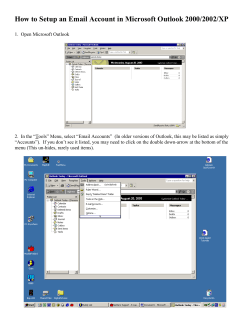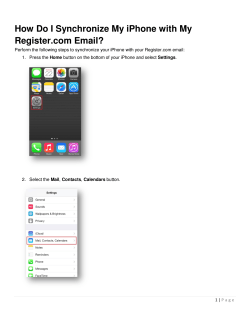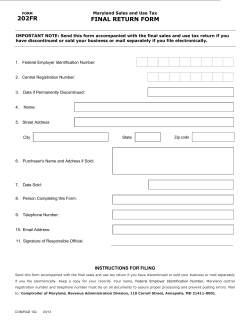
The crisis in eSourcing - and how to fix it -
The crisis in eSourcing - and how to fix it How one of the greatest value-generating tools in the history of business went sideways, and what we can do to straighten it out. In business, everyone is looking for the “next big thing” that will create a material impact on their organization’s performance. Every year, we are flooded with “new” approaches to generating value. A walk through any airport bookstore provides numerous examples. It isn’t often that you see an approach with a proven track record, that works at almost every organization that tries it, and that generates out-sized returns. More rare still is a tactic that has well-documented staying power and that works consistently as opposed to only the first few times you try it out. Ole Nielsen CEO, Scanmarket North America eSourcing IS that approach You’d think that something that really works would make its way into every corporate boardroom and operating model. However, that’s not always the case. Very few organizations have made eSourcing a part of their standard toolkit as evidenced in Scanmarket’s recent eSourcing survey. So if it works so well, why the @#$% isn’t everyone using it all the time? 1. What eSourcing is This article will explore this seeming disconnect, why it happens, and most importantly how to fix it. Spoiler alert: it comes down to inertia, economic incentives for providers, lack of sexiness, and the tyranny of “good enough”. We’ll do so with the following structure: 1. What eSourcing is 2. Why it matters 3. Where it stands 4. What went wrong 5. How to fix it 6. Why we’re qualified to weigh in Chances are, if you’re reading this article you’re already familiar with eSourcing. If that’s the case, you should definitely skip this section. For the unfamiliar, eSourcing is the process of using online capabilities to streamline the process of soliciting evaluating proposals from suppliers for the buying needs of an organization. However, eSourcing is not just about technology. While the technology is a critical element, the real goal is to increase the velocity and competitive dynamics of your sourcing process. The mantra “People, Process and Technology” holds as true here as it does elsewhere. www.scanmarket.com mail@scanmarket.com Procurement professionals use eSourcing by building their solicitations in the platform, selecting vendors for invitations, and publishing the RFx (i.e. RFI-Request for Information, RFP-Request for Proposal, or RFQ-Request for Quotation) to the invited bidders. Bidders respond online and are able to revise their bids, interact with the buyers, and respond to requests in real time. All the information from the process is compiled in one place for comparison, evaluation and decision-making. Over time, the amount of information collected serves as both an intelligence trove and source of templates for future events. 2. Why it matters At its core, eSourcing is primarily a productivity and communication tool. By increasing the capacity of staff, providing better structure to what they do, and improving the transparency and competitive dynamics in bidding, eSourcing is able to generate out-sized results compared to the required investment. In a well-publicized graphic from the mid-2000’s, Aberdeen quantified the benefits of eSourcing: Cost Savings Sourcing Cycle Times Administration Costs Time to Market For a profession that uses Excel and pen & paper all too often, this should be a revelation. Something like a “Welcome the 21st Century” moment. 3. Where it stands Like so many features common to our era, eSourcing came about as a result of the rise of the internet. In keeping with the traditional path of the Gartner hype cycle, there was an immediate rush to exploit this new tool that could drive so much profit. The results were further influenced by the fact that many of the spend categories involved had not been targeted previously, producing enormous savings rates of 30, 40 or 50+ percent. Companies rushed to establish eSourcing programs based on these results and many consulting and software providers were established to support their efforts. 14,3% 15% 50% 60% Source: Strategic Sourcing in the Mid-Market Benchmark, AberdeenGroup Unlike other productivity tools that have only intuitive or “soft” benefits, eSourcing produces real dollars where it’s used. And these dollars can have a dramatic impact on a company’s performance. For example, assuming an organization spends half its revenues on external purchases (not uncommon), direct savings from eSourcing can provide a gross profit benefit equal to 178 basis points on revenue, even if it’s applied to only 25% of purchases. Show me a CEO or CFO that wouldn’t sell their mother, or at least a favorite aunt, for 178 basis points… Once the initial excitement wore off, eSourcing became “just another tool” and entered its inevitable phase of disillusionment to paraphrase a popular analyst tool. Stories circulated about how online competitive bidding ruined buyer-supplier relationships and depersonalized the process. As with any tool, it really depends on how you use it. This only tells part of the story. There were also many anecdotes about how buyers used eSourcing to cope with reduced resources, Procurement leaning on eSourcing to help their companies survive the pressures of the recession, and even suppliers latching on to eSourcing as a way to find new opportunities and gain increased visibility to buyers’ needs and market dynamics Just another tool? In addition, the efficiency savings can be substantial. One overlooked area is compliance. By using standardized processes, templates and repositories, organizations can ensure that their sourcing processes are happening the way they want them to. www.scanmarket.com mail@scanmarket.com In our recent eSourcing survey (available on www.scanmarket.com), we surveyed 162 companies across the spectrum of eSourcing (new/old, Scanmarket customer/not) and found the following: Most have some experience with eSourcing Everyone who’s tried it has seen value and savings Few have really stepped on the gas (i.e. more than 100 eSourcing events per year) Challenges feel into several categories including stakeholder reluctance, resources, hard-to-use tools, etc. Source: Scanmarket eSourcing Survey 2013 Again, if it works so well, why the @#$% isn’t everyone using it all the time? 4. What went wrong From our standpoint, the reason that eSourcing is not as prevalent as cloud storage, VOIP telecommunications or other internet-based programs boil down to a few items. • Stuff that’s important vs. Stuff that’s on fire • Providers have frequently failed their customers • It’s just not sexy anymore • The tyranny of “good enough” Stuff that’s important vs. Stuff that’s on fire Ironically, the productivity that eSourcing provides frequently contributes to its lack of broader application. Procurement teams that were cut deeply during the recession have seldom returned to full staffing levels. As a result, they are (rightly) focused on larger, more strategic categories. These categories are less conducive to competitive bidding given their impact on the broader organization (although one could argue that the use of eSourcing is even MORE important for these categories). Providers have frequently failed their customers Simply put, the provider community (both software and services) has frequently failed its eSourcing customers on multiple fronts. The very ability for organizations to use the eSourcing tools on their own meant that there was less opportunity to generate lucrative consulting or services revenue. Whether a customer used the event once or a thousand times a year really didn’t matter much until renewal time and even then only as much as was necessarily to check the internal ROI box (see “good enough” below). Ironically, more use could mean more customer service demands which dragged down margins since support is usually bundled into the price. To keep down costs, providers made expert support ever harder to come by, forcing users to either endure long wait times for help or deal with staff who were not exactly eSourcing “experts”. In an effort to differentiate themselves from their competitors and create upsell opportunities, the providers layered on additional functionality as fast as they could. The analyst community assisted here by ranking providers based on advanced functionality that most would rarely if ever use. Instead of creating better tools, this just created confusion among the user base. www.scanmarket.com mail@scanmarket.com As the penetration rate of eSourcing grew at large enterprises, the primary providers turned their focus to selling customers ever more modules or looking for variable revenue streams that would keep the meter running. Lastly, most of the original leading eSourcing providers have been swallowed up by behemoths (you know who you are). This has inevitably led to a reduced focus on eSourcing and increased focus on how to create “synergies” with the acquiring company’s product line (see the excellent article from 2014/02/07 at spendmatters.com). All of these have combined to make many providers’ attitude boil down to “So long as you renew, whatever. And did I mention our new widget you might be interested in?” It’s just not sexy anymore The topics of discussion in our industry are set at conferences and online forums. Conferences and forums pick topics based on what analysts and providers are willing to talk about (after all, they’re paying the bills). Analysts and providers want to talk about what they’re trying to sell next. Frequently, potential agenda topics will be discarded not because they don’t have value but rather because “we’ve done that before”. To be fair, many of the industry analysts in particular have strong backgrounds in sourcing and have published very good material on it in the past. However, part of the analyst’s role is to explain the new and unfamiliar to the rest of us. This will naturally cause them to be drawn to the “shiny object in the room”. The tyranny of “good enough” Standard ROI calculations have also hampered broader adoption of eSourcing. If you’re looking for the typical 10:1 payback on an investment, and your eSourcing subscription costs you $100k/year, then it’s not hard to get to the $1MM payback that satisfies those evil trolls in finance and allows you to turn your attention elsewhere. A couple $5MM bids will get you there. It doesn’t really matter that there’s significant money left on the table in other categories, you’re got more pressing things to do (see Stuff that’s Important above). It’s hard to get the resources and executive attention necessary to build a program when your people are too focused on just keeping the wheels turning. 5. How to fix it In the past, we’ve seen comparisons between eSourcing and gym memberships, flossing and a host of other things. In order to get the most out of your eSourcing, it all boils down to six simple techniques: • Go big or go home – Since you have something that can create material, needle-moving results for your organizations, don’t stop at OK!!! It’s not very often that we have a way to impact results so much that we get mentioned on the quarterly earnings call. Carpe Diem! • Keep it simple – You’re much better off getting more events from more people than trying to perfect the highly complicated, perfect event. • Technology alone is not the solution – While most of the eSourcing platforms are strong, the key to success is having the right program, sponsorship, support and expertise in place so that your users feel comfortable. • Volume is everything – Since the benefits are well-documented, don’t spend too much time searching for the “perfect” project. Instead, focus on getting as much volume through your program as possible. Some projects will deliver huge results, some less so. But over time, you will average 13-17% savings. • Make it easy – The biggest hurdle is stakeholders who are reluctant to participate because they’re not familiar with the system or find it hard to use. Make sure your platform is intuitive and there’s help available when needed. • Leverage your providers, but do so with your eyes open – The providers have a wealth of knowledge and expertise and can be a great source of information and intelligence that you should use. However, just know that their primary aim is to sell you “the next thing”. www.scanmarket.com mail@scanmarket.com 6. Why we’re qualified to weigh in As founders of one of the original eSourcing providers (1999), we feel ourselves uniquely qualified to comment on the industry having seen it since its inception in the late 90’s. Given our history, it’s hard to see so many eSourcing programs languish in the pit of mediocrity and it makes us want to look for answers. While our customers experience above-average usage rates, we don’t just want to help our customers; we want everyone to understand and apply the value of eSourcing. Scanmarket is a provider dedicated to the idea that eSourcing solutions should be easy to use, easy to get help, and easy to do business with. The conclusion is simple Given all the compelling evidence of the value of eSourcing, instead of asking yourself and your colleagues “Why?’ shouldn’t you be asking “Why Not?” is a market-leading eSourcing provider that delivers superior bottom-line results in savings, transparency and efficiency to hundreds of organizations globally. We achieve this by dramatically increasing eSourcing adoption and volume through a proven cloudbased platform that is easy to use, easy to get expert support, and easy to do business with. Companies frequently see gains of >300% in eSourcing adoption and volume when switching to Scanmarket. Whether it is Spend Analysis, eRFx, eAuction, Contract Management or Consultancy Services can help your organization get the results you need. In the words of one of our customers, “With Scanmarket, you can do on your lunch break what used to take all day on another solution.”
© Copyright 2025









